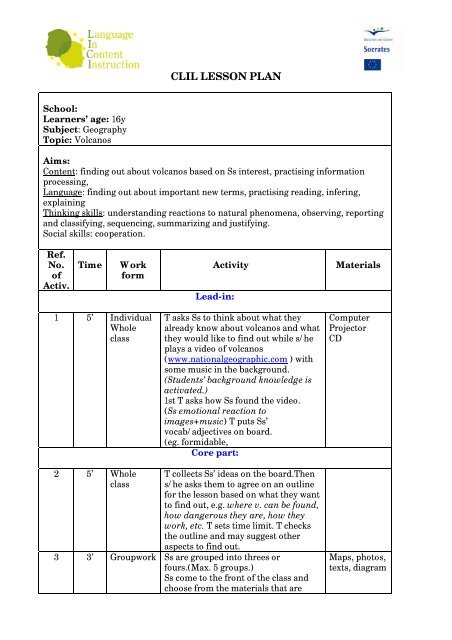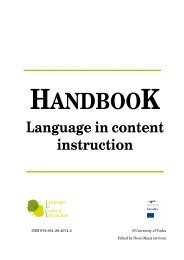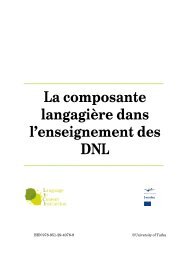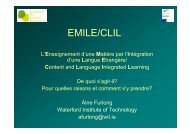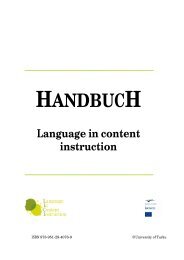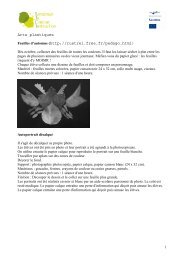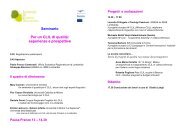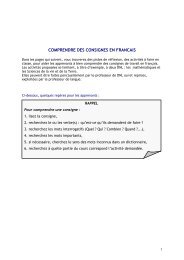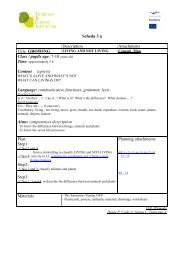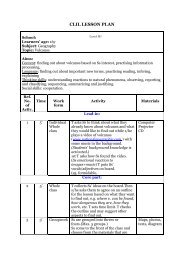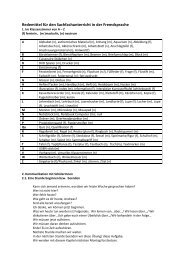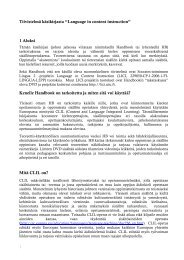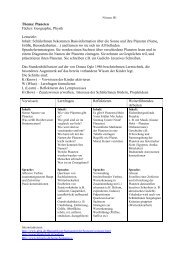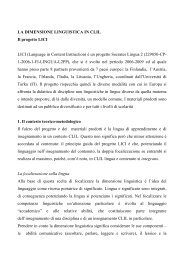CLIL LESSON PLAN
CLIL LESSON PLAN
CLIL LESSON PLAN
You also want an ePaper? Increase the reach of your titles
YUMPU automatically turns print PDFs into web optimized ePapers that Google loves.
School:<br />
Learners’ age: 16y<br />
Subject: Geography<br />
Topic: Volcanos<br />
<strong>CLIL</strong> <strong>LESSON</strong> <strong>PLAN</strong><br />
Aims:<br />
Content: finding out about volcanos based on Ss interest, practising information<br />
processing,<br />
Language: finding out about important new terms, practising reading, infering,<br />
explaining<br />
Thinking skills: understanding reactions to natural phenomena, observing, reporting<br />
and classifying, sequencing, summarizing and justifying.<br />
Social skills: cooperation.<br />
Ref.<br />
No.<br />
of<br />
Activ.<br />
Time<br />
Work<br />
form<br />
1 5’ Individual<br />
Whole<br />
class<br />
2<br />
5’<br />
Whole<br />
class<br />
Activity<br />
Lead-in:<br />
T asks Ss to think about what they<br />
already know about volcanos and what<br />
they would like to find out while s/he<br />
plays a video of volcanos<br />
(www.nationalgeographic.com ) with<br />
some music in the background.<br />
(Students’ background knowledge is<br />
activated.)<br />
1st T asks how Ss found the video.<br />
(Ss emotional reaction to<br />
images+music) T puts Ss’<br />
vocab/adjectives on board.<br />
(eg. formidable,<br />
Core part:<br />
T collects Ss’ ideas on the board.Then<br />
s/he asks them to agree on an outline<br />
for the lesson based on what they want<br />
to find out, e.g. where v. can be found,<br />
how dangerous they are, how they<br />
work, etc. T sets time limit. T checks<br />
the outline and may suggest other<br />
aspects to find out.<br />
3 3’ Groupwork Ss are grouped into threes or<br />
fours.(Max. 5 groups.)<br />
Ss come to the front of the class and<br />
choose from the materials that are<br />
Materials<br />
Computer<br />
Projector<br />
CD<br />
Maps, photos,<br />
texts, diagram
displayed there, e.g. a map with the<br />
location of volcanos in the world +<br />
text explaining their location, a<br />
diagram showing one way of<br />
eruption procedure + text about<br />
different types of eruption, photos of<br />
different shapes/types of volcanos+<br />
text<br />
4 10’ Groupwork T tells students that they need to work<br />
with the information so that they can<br />
present it to the others and sets time<br />
limit.Ss process information and<br />
produce notes, diagrams, shortened<br />
texts. They also produce word cards<br />
(max. 5) of the most important new<br />
words, eg. crust, divergent and<br />
convergent tectonic plates, vent,<br />
hotspots, dormant, active, extinct,<br />
mantle convection.<br />
5 15’ Whole<br />
class<br />
6 7’ Whole<br />
class<br />
Each group puts on the board what<br />
they have prepared and tells the others<br />
what they’ve found out. They follow<br />
the outline they agreed on at the start<br />
of the lesson. Ss take notes. Teacher<br />
monitors, corrects, provides essential<br />
info that Ss might have overlooked,<br />
explains when necessary.<br />
One group will be responsible for<br />
putting the outline with all the selected<br />
materials (texts, photos, diagrams) on<br />
the common LMS the same day.<br />
Closure:<br />
T presents multiple choice test at the<br />
website and whole class tries to<br />
answer the Qs. They check their<br />
answers in the answers page. They<br />
revise new terms with the word cards.<br />
T will put a link on the LMS to the<br />
multiple choice test so that Ss can do it<br />
on their own before coming to the next<br />
class. T puts the word cards into the<br />
box of words, where they collect<br />
important, new vocabulary items.<br />
(Extra material: volcano crosswords)<br />
Maps, photos,<br />
texts, diagram<br />
Maps, photos,<br />
texts, diagram<br />
Computer<br />
with Internet<br />
+ projector<br />
Or:Interactive<br />
whiteboard
References:<br />
Websites:<br />
http://video.nationalgeographic.com/video/player/environment/environment-naturaldisasters/volcanoes/volcano-eruptions.html<br />
http://www.worldvolcanoes.info/map.html<br />
wikipedia<br />
How Volcanoes Work - Educational resource on the science and processes behind<br />
volcanoes, intended for university students of geology, volcanology and teachers of earth<br />
science. Crosswords: http://www.geology.sdsu.edu/how_volcanoes_work/Home.html


